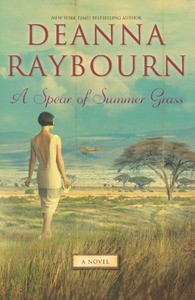Take a photo of a barcode or cover
In tone and the ballsiness of the main character, this book reminded me of something by Barbara Michaels. Which is a really good thing! But about 20% through I started to wonder if this novel had a plot, and I'm still wondering. Also, even though that pirate guy is marginally interesting on his own in an obviously-modeled-after-Michael-Douglas-in-Romancing-the-Stone sort of way, I didn't feel like there was any chemistry between him and the main character.
Basically not a lot going on to keep my interest in this one. Not that there weren't things happening, it's just that all the things seemed pointless. This book needed a MacGuffin or something.
Basically not a lot going on to keep my interest in this one. Not that there weren't things happening, it's just that all the things seemed pointless. This book needed a MacGuffin or something.
3.5 leaning to 4
I tend to be wary of historical fiction (and definitely romance) set in colonial Africa, but this was surprisingly good. I thought the political situation and the range of attitudes on the part of the white colonialists were plausible and somewhat historically accurate. However, this story by its very nature trucks with problematic narratives. We have a white woman going to "Africa" and finding herself; romanticization of "Africa" as if it were a singular entity rather than a highly diverse continent; a white savior trope (none of the native characters have much agency).
That said, Delilah was a delight. I loved how confident she was in her sexuality and that her and Ryder's relationship was not threatened by that.
The other major downside was the ending was quite abrupt. Plus I always want more politics...
I tend to be wary of historical fiction (and definitely romance) set in colonial Africa, but this was surprisingly good. I thought the political situation and the range of attitudes on the part of the white colonialists were plausible and somewhat historically accurate. However, this story by its very nature trucks with problematic narratives. We have a white woman going to "Africa" and finding herself; romanticization of "Africa" as if it were a singular entity rather than a highly diverse continent; a white savior trope (none of the native characters have much agency).
That said, Delilah was a delight. I loved how confident she was in her sexuality and that her and Ryder's relationship was not threatened by that.
The other major downside was the ending was quite abrupt. Plus I always want more politics...
New characters, new continent, new time period, new genre, but the same magnificent writing I've come to expect from Deanna Raybourn. Within just a few pages, she had sucked me into Delilah's world and had me connecting with a character who on paper might seem less than sympathetic. I found myself wandering the bush of Africa. I didn't think it was possible for Raybourn to create characters I loved as much as Lady Julia and Nicholas Brisbane, but Delilah and Ryder give that twosome a run for their money - dare I say I love them equally. I never wanted the book to end. How many more days until her next book?
I often go into a new series or a standalone by an author I love with a little trepidation. My biggest worry is usually that it will be too similar to earlier books. I love Lady Julia, but I don't want to read a cookie cutter of her with new dressing.
My trepidation was unfounded. I probably do not love Delilah and Ryder as much as I adore Julia and Brisbane, but as I read A Spear of Summer Grass I forgot the latter pair even existed. Delilah is delightful with her unapologetic spoiled decadence, but she is not the shallow ninny her lifestyle might suggest. She reveals herself to have incredible kindness and depth of character. "I am no one's best example," quips Delilah at one point. How wrong she was.
I also really appreciated that this was not just a murder mystery, not just a romance based around a smouldering man, but rather a subtle sort of adult coming-of-age with Africa as the real romantic hero who opens her eyes; It's not about whodunit or the hot guy, it is about Delilah's pain, recovery, and finding out who she is meant to be. Raybourn's description of Africa is completely compelling, capturing how different and isolating the land and culture are, which are exactly the qualities that make it so inspiring and empowering.
True storytelling talent really comes through when an author of an established series can create a new, strong voice, and Ms. Raybourn is clearly brimming with talent. The dialogue and prose in this book sparkle with natural ease and confidence in the language without being pretentious or overreaching. A Spear of Summer Grass is outstanding and is Deanna Raybourn's best writing yet.
My trepidation was unfounded. I probably do not love Delilah and Ryder as much as I adore Julia and Brisbane, but as I read A Spear of Summer Grass I forgot the latter pair even existed. Delilah is delightful with her unapologetic spoiled decadence, but she is not the shallow ninny her lifestyle might suggest. She reveals herself to have incredible kindness and depth of character. "I am no one's best example," quips Delilah at one point. How wrong she was.
I also really appreciated that this was not just a murder mystery, not just a romance based around a smouldering man, but rather a subtle sort of adult coming-of-age with Africa as the real romantic hero who opens her eyes; It's not about whodunit or the hot guy, it is about Delilah's pain, recovery, and finding out who she is meant to be. Raybourn's description of Africa is completely compelling, capturing how different and isolating the land and culture are, which are exactly the qualities that make it so inspiring and empowering.
True storytelling talent really comes through when an author of an established series can create a new, strong voice, and Ms. Raybourn is clearly brimming with talent. The dialogue and prose in this book sparkle with natural ease and confidence in the language without being pretentious or overreaching. A Spear of Summer Grass is outstanding and is Deanna Raybourn's best writing yet.
adventurous
lighthearted
medium-paced
Plot or Character Driven:
A mix
Strong character development:
Yes
Loveable characters:
Yes
Diverse cast of characters:
Yes
Flaws of characters a main focus:
Yes
I'm debating on my feelings about this book. I enjoyed it more towards the middle but I really dislike it when I have to wait until the middle of a book to like characters or the story itself. I think the setting itself was wonderful and different for a book dealing with the 1920's and taking place in Africa with female character who is very much the outgoing socialite of the 1920's who partied hard and had that reputation following her around the world. This is also very much a mystery novel which many think that this female character has murder one of her husbands since one of her ex-husbands of many have also passed away and when she has been the wife. I guess this was the part that kept me reading to find out whether she could be involved in some way with the deaths of her husbands. I will not give away this mystery since I hate spoilers.
This year alone I have read quite a few books with a female protagonist from the 1920s. The cliché that writers seem to fall upon with these flapper characters is to make all of them vapid and frivolous, so when I read the first two chapters of this book I was disappointed and expected Deanna Raybourn to give me more of the same. But Delilah Drummond is more than appearances and the persona that she presents to the world. Once she is shipped off to Kenya to lay low as a scandal tarnishes her name in Europe she achieves a level of maturation and growth.
As she did to Ryder White, Delilah constantly surprised me. She never allowed Africa or her circumstances to defeat her. Instead she met challenges head on. She came from a life of great privilege yet she immersed herself in all that Africa had to offer. Delilah took time to lean about the land, the animals, the politics, and the native people. I believe that a great deal of credit also needs to be bestowed upon Deanna Raybourn for placing her readers in Africa with such skill. I felt as if I were also in the bush; the descriptions and environment were enchanting and placed me by Delilah’s side throughout her journey. A character I had disliked from page one grew on me to the point that I had a healthy amount of respect for her.
My only detraction from the story was the conflict that came about late in the book. I found it a bit random and was not pleased with how it was resolved. I can understand why it was included, however, for it illustrated the unfair treatment between the whites and the natives in terms of justice. But I would have simply chosen another type of conflict to get that point across. Then, in relation to that conflict, I suppose you could also say that I would have loved to ship off some of the white settler characters, merely because they represented all that I already touched upon in the beginning of this review about what I hate about characters from the 1920s.
Those detractions aside, this was a great story about a woman fortifying her strength in a new landscape while learning how to overcome scars inflicted on her from the past.
As she did to Ryder White, Delilah constantly surprised me. She never allowed Africa or her circumstances to defeat her. Instead she met challenges head on. She came from a life of great privilege yet she immersed herself in all that Africa had to offer. Delilah took time to lean about the land, the animals, the politics, and the native people. I believe that a great deal of credit also needs to be bestowed upon Deanna Raybourn for placing her readers in Africa with such skill. I felt as if I were also in the bush; the descriptions and environment were enchanting and placed me by Delilah’s side throughout her journey. A character I had disliked from page one grew on me to the point that I had a healthy amount of respect for her.
My only detraction from the story was the conflict that came about late in the book. I found it a bit random and was not pleased with how it was resolved. I can understand why it was included, however, for it illustrated the unfair treatment between the whites and the natives in terms of justice. But I would have simply chosen another type of conflict to get that point across. Then, in relation to that conflict, I suppose you could also say that I would have loved to ship off some of the white settler characters, merely because they represented all that I already touched upon in the beginning of this review about what I hate about characters from the 1920s.
Those detractions aside, this was a great story about a woman fortifying her strength in a new landscape while learning how to overcome scars inflicted on her from the past.



